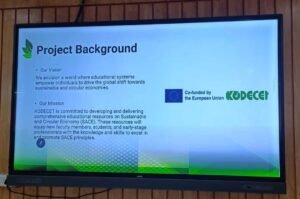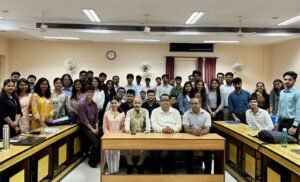Cultivating Sustainability Champions: Promoting KODECET Across Indian Campuses

As an educator passionate about sustainability and circular economy, I recently had the privilege of engaging with bright minds at four esteemed institutions across India. These serendipitous encounters, which aligned with the spirit of our KODECET project, took place at the Birla Institute of Management Technology (BIMTECH) in Greater Noida, Management Development Institute (MDI) in Gurugram, and both Nirma University and Adani University in Ahmedabad. Each interaction offered unique insights and perspectives, contributing to an enlightening exploration of sustainability education in India.
Throughout my lectures, I had the opportunity to introduce our KODECET project, which aims to establish digital centers of excellence for sustainability and circular economy education in Indian and Thai universities. The response was overwhelmingly positive, with both students and faculty recognizing the project’s potential to bridge crucial knowledge gaps.
My Reflection and Experience

Delivering lectures on sustainability and circular economy across various Indian institutions has been an incredibly rewarding experience. What struck me most was the impressive range of perspectives on these crucial topics. Each university, with its own distinct academic environment and student body, brought a unique flavor to our discussions, enriching the exploration of sustainability and circular economy principles.
One key takeaway was the emphasis on applying these concepts to real-world challenges. Students were eager to discuss how circular principles could reshape business strategies in India’s dynamic economic landscape. Their ability to connect global sustainability trends with local business contexts was particularly impressive. This ability to bridge the gap between theory and practice, combined with their understanding of the local context, highlights their potential as future leaders in sustainable business.
The students’ analytical capabilities excelled through, especially in their approach to case studies. They critically examined global circular economy implementations, considering their adaptability and impact within the Indian context. This demonstrated a nuanced understanding of the complexities of sustainable development, recognizing that solutions need to be tailored to specific social, economic, and environmental factors.
The interdisciplinary nature of sustainability also became apparent during these lectures. Engaging with students from diverse academic backgrounds, including management, engineering, and environmental sciences, underscored how circular economy principles transcend traditional academic boundaries. This cross-pollination of ideas from different disciplines fostered a collaborative environment where innovative, holistic solutions could emerge.
The entrepreneurial spirit was palpable throughout these engagements. Students were particularly excited about how circular economy concepts could drive new business models and startups. They recognized that sustainability is not just an environmental imperative, but also a catalyst for economic growth and job creation. This perspective is incredibly encouraging, as it positions sustainability as an opportunity for innovation and economic development.

A common thread across all institutions was the students’ ability to draw parallels between modern circular economy principles and India’s traditional practices of resource conservation and reuse. This synthesis of age-old wisdom with cutting-edge innovation was particularly inspiring, suggesting a unique Indian approach to sustainability that honors cultural heritage while embracing global best practices.
The prospect of accessing locally relevant, high-quality education in sustainability and circular economy resonated strongly with students, who saw it as a pathway to enhancing their skills and employability in an increasingly sustainability-focused job market. Faculty members were particularly excited about the capacity-building aspects of KODECET, acknowledging the need for continuous learning in this rapidly evolving field.
The project’s emphasis on fostering university-business cooperation struck a chord with many, who recognized it as a vital step in translating academic knowledge into practical implementation. This alignment between education and industry needs was seen as crucial for driving meaningful change in sustainability practices.
Challenges and Opportunities
Our discussions often centered on the unique challenges and opportunities India faces in adopting circular economy principles. Students and faculty alike were quick to identify potential roadblocks, from infrastructure limitations to policy gaps. However, what impressed me most was their problem-solving attitude and innovative thinking in proposing solutions.
The recognition of circular economy not just as an environmental necessity, but as a significant economic opportunity for India, was a recurring theme. Many saw it as a means to address multiple challenges simultaneously, from waste management and resource scarcity to job creation and economic growth.
A Future Full of Promise
As I reflect on these experiences, I am filled with optimism for the future of sustainability in India. The enthusiasm, critical thinking, and commitment to positive change I witnessed across these institutions are testament to the potential of India’s youth to drive sustainable development.
The KODECET project, with its focus on creating accessible, high-quality education in sustainability and circular economy, is poised to play a crucial role in nurturing this potential. By providing tailored, context-specific learning resources, we aim to empower the next generation of leaders with the knowledge and skills needed to implement circular economy principles effectively.
My journey as a guest lecturer in India has reinforced my belief in the power of education to catalyze change. As we move forward with KODECET, I am excited to see how these digital centers of excellence will further accelerate sustainability education and innovation across India and Thailand.
The insights gained, connections made, and ideas exchanged during this experience will undoubtedly shape the future development of our project. More importantly, they have given me a renewed sense of purpose and excitement about the role of education in creating a more sustainable, circular future – not just for India, but for the world.